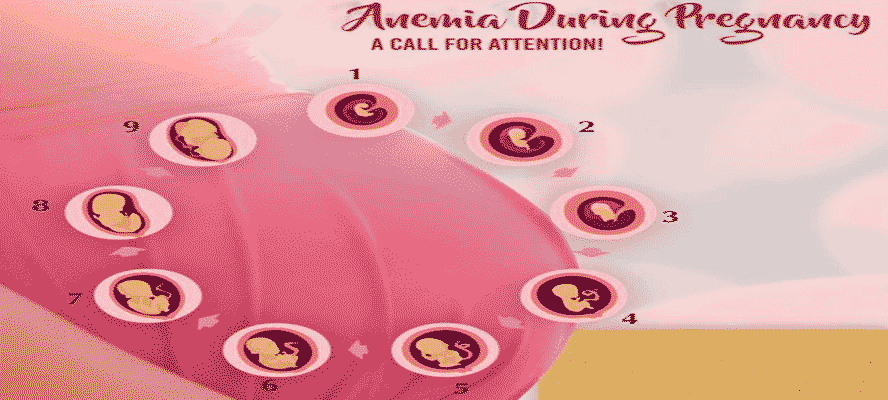It is a condition defined by decreased amount of healthy Red blood cells (RBCs) in blood or decreased oxygen carrying capacity of RBCs due to insufficient amount of hemoglobin. Hemoglobin is protein rich in iron present in RBCs and helps transporting oxygen from lungs to other body parts. In most of the individual’s suffering from anemia, their body doesn’t get enough oxygen-rich blood which may lead to tiredness or weakness. Although, the signs and symptoms vary according to the severity of anemia, severe or long-lasting anemia can damage the heart, brain and other organs.
Loss of blood, lack of RBC production and increased rates of RBC destruction are the major causes of anemia. This may be due to certain diseases, conditions or other factors. There are several types of anemia with different causes and characteristics. Some of them are- Iron deficiency anemia, Folate deficiency anemia, Aplastic anemia, Hemolytic anemia, Sickle cell anemia, thalassemia, and Fanconi anemia.
Anemia affects both men and women of all age, race and ethnic groups. However, pregnant women are at a greater risks of anemia due to the associated low levels of iron and Folic acid. Dilution of the blood in pregnant women is another reason which causes anemia. It arises due to increase of blood plasma volume more than the red blood cell concentration (known as hemodilution) and is often seen during first six months of pregnancy.
Anemia and Pregnancy
During pregnancy, the body undergoes certain physiological changes. These changes cause increased demands of
iron and other nutrients in pregnant women along with hemodilution. If these demands are not fulfilled, it may lead
to anemia due to decreased production of RBCs. If anemia during pregnancy is diagnosed early then it can be treated
but if left untreated it can cause severe complications to both mother and the fetus. Among several types of anemia,
the two most commonly occurring forms during pregnancy are iron deficiency anemia and folate deficiency anemia.
Iron Deficiency Anemia
Iron Deficiency anemia during pregnancy is highly common worldwide in both developing and developed countries.
This is because during pregnancy iron demands are increased and varies according to the different trimesters. In
the first trimester, iron demand decreases due to absence of menstruation, however in the second trimester,
demands for iron increases due to increase of blood plasma volume and in the third trimester fetal demand for
iron is maximum. This type of anemia mainly depends on two factors woman’s iron stores during conception and
the total amount of iron absorbed during gestation. Due to Iron supplements increased demands of iron during
pregnancy, dietary intake alone is insufficient, thus requires iron supplements. Pregnant women with anemia due
to iron deficiency often experience breathing problems, tiredness, palpitations and difficulty in sleeping.
Folate Deficiency Anemia
Folate or vitamin B9 is an essential nutrient which is required for the replication of DNA, amino acid synthesis and
vitamin metabolism. More importantly it is required for the process called erythropoiesis, which is the process by
which RBCs are produced in the bone marrow. During pregnancy, folate demand increases due to its requirement
for growth and development of the fetus. This leads to its deficiency causing anemia. Our body can’t synthesize
folate on its own and can only be obtained from diet or supplements. Severe folate deficiency during pregnancy
can cause preterm birth and neural tube defects in the baby. Pregnant women suffering from folate deficiency
anemia may experience decreased appetite, irritation, lack of energy and diarrhea.
Are you at Risk?
Severe anemia have negative consequences on mother’s health. It can lead to increased risk of maternal
morbidity and mortality. It is more common in pregnant women
- with more than one child.
- eating food which generally lacks iron.
- suffering from a chronic illness before or during pregnancy.
- having any intestinal parasitic infections.
- who have experienced heavy periods before pregnancy.
- vomiting frequently due to morning sickness. It is also seen more in teenage pregnancies
- women with pregnancy in quick succession.
Is your Baby at Risk?
Effects of anemia on baby depends upon the severity of anemia. Untreated anemia during pregnancy may
have adverse consequences on the fetus like low birth weight, prematurity, fetal distress (abnormal heart
rate pattern in the fetus), fetal deaths and neonatal anemia. Once the baby is born, doctor generally checks
the Apgar score which checks the baby’s heart rate, breathing rate, skin color, muscle tone and reflexes.
Anemia during pregnancy can leads to poor Apgar score which means the baby needs medical attention.
Symptoms of Anemia During Pregnancy
- Fatigue
- Rapid heartbeat
- Dizziness
- Cold hands and feet
- Pale skin, lips and nails
- Concentration problem
Is it Preventable?
The best way to treat anemia is to diagnose it as early as possible. To avoid anemia during pregnancy
one should always maintain good health before and during pregnancy. Pregnant women should consume
balanced diet containing all the nutrients and minerals. Apart from well balanced diet, intake of iron, and
folate supplements are also recommended by various doctors. However proper dosage of supplements
should be taken as recommended by physicians because if taken in excess, can be harmful.
Thyrocare provides complete anemia profile covering several parameters like tests for iron and folate deficiency by using advanced technologies like Photometry and C.L.I.A. respectively at an affordable price.








